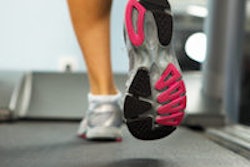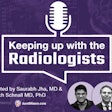
Does the radiology work environment make radiologists fat? The answer may be yes, as many radiologists reported that their sedentary work environment has contributed to weight gain, according to research presented at the recent RSNA meeting.
"Radiologists, on average, believe their career has contributed to weight gain and/or an overall decrease in health," said presenter Dr. Andrew Wagner of Tufts University in Medford, MA. "The work environment, with its long periods of sitting and a longer-than-average workday, likely contributes to this sentiment."
 Dr. Andrew Wagner of Tufts University.
Dr. Andrew Wagner of Tufts University.Wagner's team administered a 21-question online survey to 353 radiologists across the U.S. (109 women and 244 men). The survey included questions about demographic information, workstation environment, reported health, weight gain, and weekly exercise activity.
"Our research was prompted by all the recent talk about how sitting is the new smoking," Wagner told AuntMinnie.com. "We wanted to investigate what radiologists were actually experiencing in regards to their health."
Eighty percent of the survey participants were attending physicians in diagnostic radiology, and the majority (54.3%) were in private practice. Although all of the U.S. was represented among the respondents, 19.2% were from the South Atlantic area (Delaware; Maryland; Washington, DC; Virginia; West Virginia; North and South Carolina; Georgia; and Florida). The second most predominant geographical area was New England, with 18.4% of study participants, while the third was the Middle Atlantic, at 12.4% (New York, New Jersey, and Pennsylvania).
Of the survey participants, 31.7% said they were in excellent health, 42.2% said they had above average health, and 21.8% said they had average health. However, more than half of respondents said that working as a radiologist has contributed to worsening health and/or weight gain, with 60% reporting weight gain since they began their career, with a mean gain of 10.8 lb.
Wagner and colleagues found a positive correlation between the average number of hours worked per day and the amount of weight gained. Only 19.2% of those radiologists who reported weight gain also exercised the recommended five days per week. The majority of survey respondents (81%) said they were willing to learn how to be more active during the workday, but only 9% believed that practice partners or administrators would support them in this.
Most radiologists (65.4%) reported having adjustable desks, which translated into less sitting during the workday and less weight gain, compared with radiologists who didn't have adjustable desks, the researchers noted.
"Adjustable workstations were common in the survey group and resulted in approximately 30 fewer minutes of sitting per day, a better sense of overall health, and less reported weight gain," Wagner said.
The researchers also found that the type of exercise radiologists engaged in affected weight gain, with high-intensity interval training, weight training, and running topping the list of the most effective activities. Surprisingly, taking walking breaks throughout the day didn't seem to have a positive effect.
"We assumed that walking breaks would help, but actually they were inversely associated with weight gain," Wagner told AuntMinnie.com. "So getting up and walking around during the day isn't enough -- exercising three to five times per week is the best solution."




















